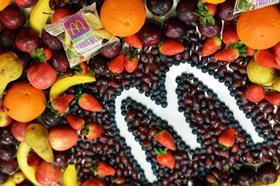
McDonald’s has set itself the goal of doubling the amount of fruit, vegetables, low-fat dairy products and whole grains it sells in its 35,000 worldwide outlets. The move forms part of the chain’s new Corporate Social Responsibility and sustainability framework, which aims to slash the environmental impact of its supply chain and operations.
Announcing the strategy at the firm’s convention for franchisees, chief executive Don Thompson said the strategy will focus on five key areas: food, sourcing, planet, people and community. It is aimed primarily at the company’s nine biggest markets in which 70 per cent of sales are concentrated, namely the US, Japan, Brazil, China, France, Germany, the UK, Canada and Australia.
Other goals include raising the proportion of its fibre-based packaging from environmentally certified or recyclable suppliers from the current 14 per cent to 100 per cent, increasing recycling at its restaurants from 36 per cent to 50 per cent, and introducing new targets for reducing the salt, sugar and saturated fat content of its food. It has also pledged to increase the energy efficiency at its company-owned restaurants by 20 per cent in its seven top markets by 2020.
Writing in the foreword of the report, Thompson said that as well as addressing ethical and environmental issues, the new strategy made good business sense. “From assuring supply and reducing the risk of long-term supply interruptions to encouraging sustainable economic growth for businesses and communities and reducing operating costs through greater efficiencies, the ways we choose to address these challenges will change the world for the better and ensure we maintain an enduring, sustainable and profitable business model,” he said.



